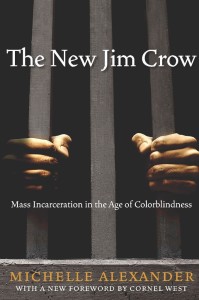 The New Jim Crow
The New Jim Crow
by Michelle Alexander
This afternoon I had a long drive from Atlanta to Nashville, and I decided to start a book I’ve been wanting to read . . . by letting my iPad read to me. Just the fact that I can drive state to state, and choose a book to “read” while driving, and let my electronic device read to me as I go, says a lot.
What it says is that I benefit from a lot of privilege and prosperity and class liberty. I have a blog and a computer to write it on, and a lot of other things that prop up my “freedoms” and “choices.”
I’m part of a system that benefits me and others. That system also harms me and others. Mostly the others who are the inheritors of slavery, racism, Jim Crow laws, and the new Jim Crow, mass incarceration.
Author, lawyer and professor, Michelle Alexander argues, “mass incarceration is, metaphorically, the New Jim Crow and that all those who care about social justice should fully commit themselves to dismantling this new racial caste system” (p. 11). She continues by addressing the objection raised by some that we live in a “color-blind” society having elected President Barak Obama to office twice: “the widespread belief that race no longer matters— has blinded us to the realities of race in our society and facilitated the emergence of a new caste system” (pp. 11-12). Black History Month, says Alexander, is often presented as a celebration of the end of Jim Crow, yet it did not end. Not exactly. It morphed into a racist system of mass incarceration.
I’m riveted by this book and Alexander’s arguments. I’m a bit late joining this conversation, and frankly my teaching a college credit course in a medium security prison last fall is what brought me fully awake to the severity of mass incarceration. I joined the Middle Tennessee group “Revisioning Justice” last fall, and members of that group are introducing me to more arguments, activists, teachers, and ideas.
As I arrived home this evening, I became aware of a campaign to try and stay an execution for Kelly Gissendaner. (If you are just learning about her situation, you can read more HERE.) The death penalty and state sponsored executions are deeply troublesome. They are interlocked with an entire system that does not reform or rehabilitate, but rather hardens people, misappropriates justice, and goes on building an economy on the backs of criminalized bodies – mostly brown and black bodies. I want to continue to move my own racialized white body into the social, economic, and class gap that the mass incarceration system creates. Once in that gap, I want to continue partnering with others to imagine new creative solutions.
For now I’m going to keep reading Alexander and see what else goes on my reading list, my to do list, my participate-in-change list. Alexander says: “if we say to ourselves that the problem of mass incarceration is just too big, too daunting for us to do anything about and that we should instead direct our energies to battles that might be more easily won, history will judge us harshly. A human rights nightmare is occurring on our watch” (p. 15).



